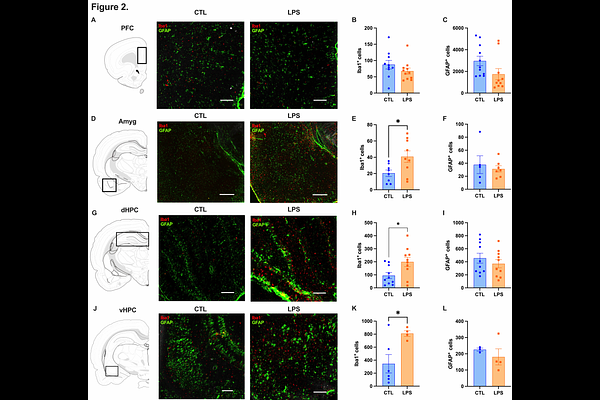Endotoxemia-induced inflammation in the absence of obesity decreases anxiety-like and impulsive behavior without affecting learning and memory

Endotoxemia-induced inflammation in the absence of obesity decreases anxiety-like and impulsive behavior without affecting learning and memory
Klug, M. E.; Crain, E.; Hayes, A. M. R.; Shanmugam, M.; de La Serre, C.; Kanoski, S. E.
AbstractObesity is associated with increased gut permeability, which contributes to a state of chronic low-grade inflammation. Obesity is also linked with altered neurocognitive functions, including impaired learning and memory. Whether these changes are secondary to neuroinflammation vs. other comorbidities associated with obesity is unknown. Here, we modeled the chronic low-grade inflammation that accompanies diet-induced obesity, but in the absence of obesity or consumption of an obesogenic diet. Male rats were implanted with intraperitoneal osmotic minipumps, continuously dispensing either saline (control) or lipopolysaccharide (LPS), an endotoxin produced in the gut that triggers inflammation when in circulation. Immunohistochemistry results revealed that LPS exposure led to neuroinflammation, with an increased number of Ionized Calcium-Binding Molecule 1 (Iba1+) cells in the amygdala and hippocampus in LPS rats vs. controls. Given that these brain regions are associated with impulse control, anxiety-like behavior, and learning and memory, we tested whether chronic LPS treatment impacted these behaviors. Interestingly, LPS exposure did not affect hippocampal-dependent memory in the Morris water maze, novel location recognition, or novel object in context memory tests, suggesting that neuroinflammation in the absence of obesity does not induce memory impairments. Further, chronic LPS significantly decreased anxiety-like behavior in the open field test and food impulsivity in an operant-based procedure. LPS animals also had significantly lower corticosterone and melatonin levels when compared to controls, which may contribute to these behavioral outcomes. These results suggest that the low-grade inflammation associated with obesity is not driving obesity-associated memory impairments but does reduce anxiety and food-motivated impulsive responses.